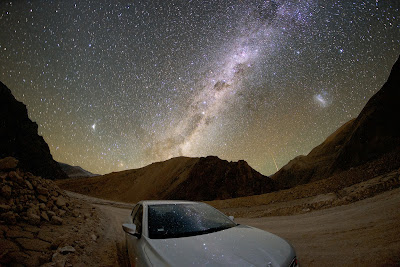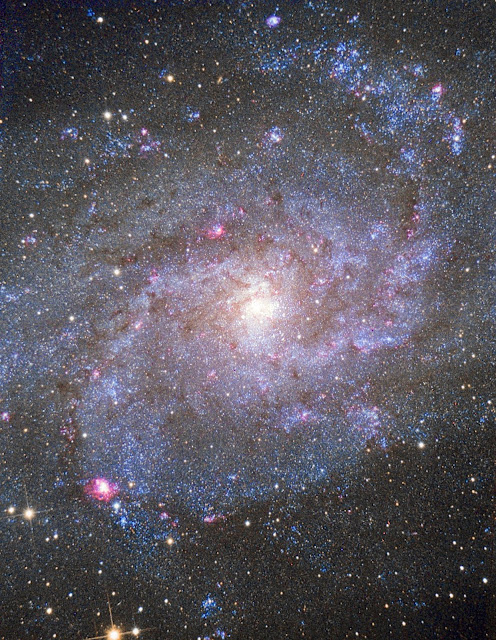When the Milky Way lights up the scene
When I was younger and was taking my first steps into the observation of the night sky, I remember very well one of my first astronomical book and especially a chapter where it described the aspect of a perfect sky.
A perfect sky is the most normal thing we can imagine: a night sky not contaminated by artificial light. It's the most normal thing because for 4.6 billion of years every living species on Earth saw it and it was normal, just like the rise and set of the Sun, every day.
In the last 100 year, the most invasive specie of the Planet was able to destroy the natural beauty of the dark sky for over 80% of the Human population. Now, after 4.6 billion of years, we are the first generation of the entire history of life on Earth that cannot see a perfect night sky. There is just one thing worse than forgetting something important: not having the possibility to do it. We then not only don't see anymore a perfect sky but almost everyone doesn't have memory about that.
When I was reading the description of a perfect night sky of that book I was so surprised that a part of me didn't actually believed the author.
Time passed fast and at some point I was the guy in the opposite side: I was the author and needed to explain to the readers the incredible beauty of an unpolluted night sky, without having had the chance to see it. I then just wrote down the words read when I was a child in that book, something like this: from a perfect night sky the Milky Way is so bright that can light up the scene and cast faint and diffuse shadows on the ground. Well, I must confess that I didn't believe in that and for more than five years I didn't think that what I wrote could be true. For five long years, until I saw the sky of the Atacama desert.
Alone in the night, after driving more than 70 km from the city on a road made of salt, I wait every time the moment when the Sun goes down and the stars starts to shine. I wait always with the same feelings, with the same expectations, like it's always the first time I see that beauty. When the night arrives and the Milky Way shines more than any other place on Earth, I always cannot believe what my eyes are seeing, something similar to this photo that I took with just 30 seconds exposure. No montage, no retouching; the sky of Atacama desert doesn't need Photoshop.
Note the light of the scene: the portion of the mountains that can't face the brightest part of the Milky Way are considerably darker than the ones that can see it.
It's unbelievable but it's real.
A perfect sky is the most normal thing we can imagine: a night sky not contaminated by artificial light. It's the most normal thing because for 4.6 billion of years every living species on Earth saw it and it was normal, just like the rise and set of the Sun, every day.
In the last 100 year, the most invasive specie of the Planet was able to destroy the natural beauty of the dark sky for over 80% of the Human population. Now, after 4.6 billion of years, we are the first generation of the entire history of life on Earth that cannot see a perfect night sky. There is just one thing worse than forgetting something important: not having the possibility to do it. We then not only don't see anymore a perfect sky but almost everyone doesn't have memory about that.
When I was reading the description of a perfect night sky of that book I was so surprised that a part of me didn't actually believed the author.
Time passed fast and at some point I was the guy in the opposite side: I was the author and needed to explain to the readers the incredible beauty of an unpolluted night sky, without having had the chance to see it. I then just wrote down the words read when I was a child in that book, something like this: from a perfect night sky the Milky Way is so bright that can light up the scene and cast faint and diffuse shadows on the ground. Well, I must confess that I didn't believe in that and for more than five years I didn't think that what I wrote could be true. For five long years, until I saw the sky of the Atacama desert.
Alone in the night, after driving more than 70 km from the city on a road made of salt, I wait every time the moment when the Sun goes down and the stars starts to shine. I wait always with the same feelings, with the same expectations, like it's always the first time I see that beauty. When the night arrives and the Milky Way shines more than any other place on Earth, I always cannot believe what my eyes are seeing, something similar to this photo that I took with just 30 seconds exposure. No montage, no retouching; the sky of Atacama desert doesn't need Photoshop.
Note the light of the scene: the portion of the mountains that can't face the brightest part of the Milky Way are considerably darker than the ones that can see it.
It's unbelievable but it's real.




👍
ReplyDelete